-
 Bitcoin
Bitcoin $82,099.5826
-1.34% -
 Ethereum
Ethereum $1,817.9545
-1.07% -
 Tether USDt
Tether USDt $0.9999
0.02% -
 XRP
XRP $2.0815
-3.96% -
 BNB
BNB $595.8647
-1.53% -
 Solana
Solana $124.0327
-0.92% -
 USDC
USDC $1.0000
0.01% -
 Dogecoin
Dogecoin $0.1634
-3.94% -
 Cardano
Cardano $0.6445
-4.65% -
 TRON
TRON $0.2336
1.34% -
 Toncoin
Toncoin $3.9381
2.61% -
 Chainlink
Chainlink $13.2201
-3.75% -
 UNUS SED LEO
UNUS SED LEO $9.0947
-5.84% -
 Stellar
Stellar $0.2646
-1.90% -
 Avalanche
Avalanche $18.6234
-3.91% -
 Shiba Inu
Shiba Inu $0.0...01214
-3.88% -
 Sui
Sui $2.2126
-6.78% -
 Hedera
Hedera $0.1604
-6.61% -
 Polkadot
Polkadot $4.0237
-1.97% -
 Litecoin
Litecoin $82.1655
-4.48% -
 MANTRA
MANTRA $6.2849
-1.13% -
 Bitcoin Cash
Bitcoin Cash $298.8203
-2.66% -
 Dai
Dai $1.0000
0.02% -
 Bitget Token
Bitget Token $4.4293
-4.57% -
 Ethena USDe
Ethena USDe $1.0000
0.01% -
 Pi
Pi $0.6976
-9.77% -
 Hyperliquid
Hyperliquid $12.5853
-0.74% -
 Monero
Monero $215.4717
-0.22% -
 Uniswap
Uniswap $5.8825
-1.85% -
 Aptos
Aptos $5.1958
-2.29%
How to verify the validity of the Ethereum wallet address after it is generated?
Verify your Ethereum address by visually checking its format (42 characters, starts with "0x"), using checksum tools for error detection, and searching it on a blockchain explorer like Etherscan to confirm its existence and activity.
Mar 24, 2025 at 11:35 am
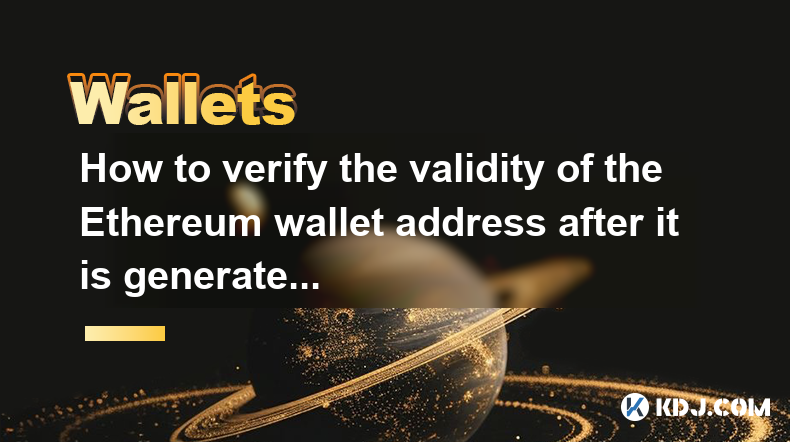
Key Points:
- Ethereum wallet addresses are generated by cryptographic algorithms; verification relies on confirming their proper formation and association with a private key.
- Verification isn't about checking a central registry; it's about ensuring the address is valid within the Ethereum network's rules.
- Tools and methods exist to assess the address's validity, ranging from simple visual checks to using blockchain explorers.
- Understanding checksums is crucial for identifying potentially erroneous addresses.
- Connecting your wallet to a reputable exchange or dapp further validates its functionality.
How to Verify the Validity of the Ethereum Wallet Address After it is Generated?
Generating an Ethereum wallet address is the first step towards participating in the Ethereum ecosystem. However, ensuring its validity is equally crucial to prevent potential losses. The process of verification doesn't involve a central authority confirming your address; rather, it involves confirming its adherence to the Ethereum network's specifications and ensuring it's correctly linked to your private key.
The most basic check involves visually inspecting the address. Ethereum addresses are typically 42 characters long and begin with "0x". Any deviation from this format immediately indicates an invalid address. Furthermore, the presence of unusual characters or an incorrect length strongly suggests an error occurred during generation.
Beyond the visual check, understanding checksums is vital. Ethereum addresses incorporate a checksum—a small piece of data appended to the address to detect errors during transcription or input. Many wallets automatically include the checksum; however, manually comparing the checksum to what the address should be is a more in-depth verification step.
To leverage this checksum, many online tools are available. These tools verify the checksum by comparing the address to the expected checksum value. A mismatch indicates an error. Remember that a valid checksum doesn't guarantee the address is associated with your private keys; it simply ensures the address is correctly formatted.
Blockchain explorers offer another crucial layer of verification. These platforms (like Etherscan or Blockscout) allow you to search for an Ethereum address. If the address exists on the blockchain and has a transaction history, it indicates the address is valid and active within the Ethereum network. The absence of any information may suggest the address is either unused or incorrect.
To confirm the functionality of your wallet and the associated address, you can try sending a small test transaction. Transferring a tiny amount of ETH to your address from another wallet (preferably a testnet) allows you to confirm that the address is functional and receives funds. This step verifies the address works correctly with your chosen wallet software.
Furthermore, many reputable cryptocurrency exchanges and decentralized applications (dApps) offer wallet address validation features as part of their services. Connecting your wallet to these platforms often involves an implicit verification process, as they check for valid addresses before allowing transactions or interactions. Be cautious, however, and only connect your wallet to trustworthy and established platforms.
Incorrectly generated or transcribed addresses can lead to the irreversible loss of funds. Double-checking every character is essential, and using multiple verification methods provides a higher degree of confidence in the validity of your Ethereum wallet address. Always be wary of suspicious websites or applications claiming to verify addresses, and prioritize using established and reputable tools and services. Remember, the responsibility for verifying the accuracy of your address ultimately lies with you.
Common Questions:
Q: What happens if I use an invalid Ethereum address?
A: Using an invalid address will result in the failure of any transaction attempting to send funds to that address. The funds will not be lost, but they will not reach their intended destination. They will remain in the sender's wallet.
Q: Can I recover an Ethereum wallet if I lose the private key, even if the address is valid?
A: No. The private key is crucial for accessing the funds associated with an Ethereum wallet address. Without the private key, even if the address is perfectly valid, recovery is impossible.
Q: Are there any fees associated with verifying an Ethereum wallet address?
A: No. Verifying an Ethereum wallet address using blockchain explorers or checksum validation tools is generally free. However, sending test transactions will incur the usual Ethereum network gas fees.
Q: How frequently should I verify my Ethereum wallet address?
A: It's recommended to verify your address whenever you create a new wallet. After that, it is not usually necessary to repeatedly verify the address, unless you suspect there might be an issue.
Q: If my wallet address is valid, does that mean it's safe from hacks?
A: A valid address simply means it conforms to the Ethereum network's standards. It doesn't guarantee security. Safeguarding your private key and practicing good security habits are paramount to preventing unauthorized access to your funds.
Q: What if the blockchain explorer doesn't show my address?
A: If a blockchain explorer doesn't show your address, it may mean the address is new and hasn't had any transactions yet, or there may be a problem with the address itself. Double-check the address for typos and try again after a while.
Q: Can I use a checksum tool to generate an Ethereum address?
A: No. Checksum tools are for validating an existing address, not generating one. You need a wallet software to generate a new address.
Q: Are all Ethereum address generators equally reliable?
A: No. Only use reputable wallet software from trusted sources to generate Ethereum addresses. Avoid unknown or suspicious sources. The security of your funds depends heavily on the security of your wallet software.
Disclaimer:info@kdj.com
The information provided is not trading advice. kdj.com does not assume any responsibility for any investments made based on the information provided in this article. Cryptocurrencies are highly volatile and it is highly recommended that you invest with caution after thorough research!
If you believe that the content used on this website infringes your copyright, please contact us immediately (info@kdj.com) and we will delete it promptly.
- CZ Announces Plan to Donate 500 BNB Each to Myanmar and Thailand
- 2025-03-31 20:00:12
- Bitcoin (BTC -2.46%) has earned a place in almost every investor's portfolio.
- 2025-03-31 20:00:12
- Bitcoin (BTC) ETF Witnessed a Major Shift as Investors Pulled out $93 Million
- 2025-03-31 19:55:12
- Nigeria Accuses Binance of Facilitating Terrorism and Kidnapping Financing
- 2025-03-31 19:55:12
- A Sentiment Shift Appears Underway Within the XRP Community
- 2025-03-31 19:50:12
- A Quarter of S&P 500 Firms Could Be Holding Bitcoin on Their Balance Sheets by 2030: Report
- 2025-03-31 19:50:12
Related knowledge

How to easily generate a Bitcoin payment address
Mar 29,2025 at 10:49am
Generating a Bitcoin payment address might seem daunting, but it's actually quite straightforward. This process is crucial for receiving Bitcoin, as each transaction requires a unique address. Understanding how this works is fundamental to using Bitcoin effectively. This guide will walk you through the simple steps, regardless of your technical experti...
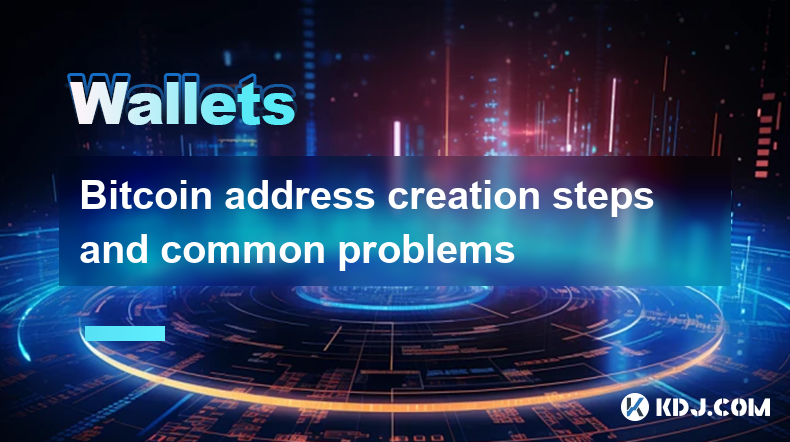
Bitcoin address creation steps and common problems
Mar 30,2025 at 06:07am
Understanding Bitcoin AddressesA Bitcoin address is a unique identifier, similar to a bank account number, used to receive Bitcoin. It's a string of alphanumeric characters generated from a public key, derived from your private key. Understanding the distinction between public and private keys is crucial for Bitcoin security. Your private key should be...
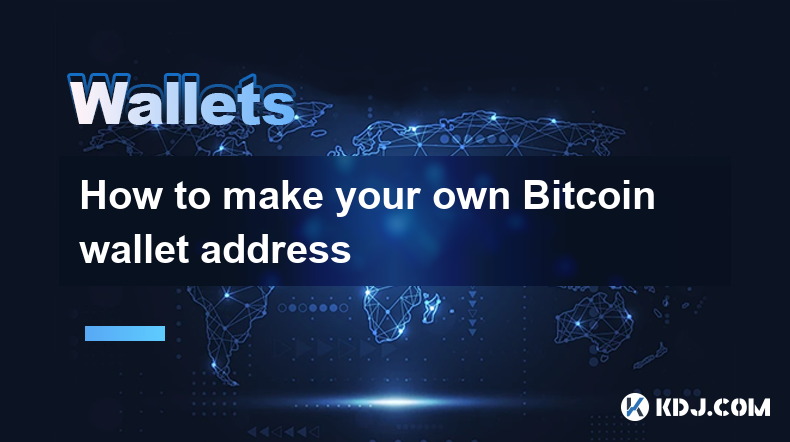
How to make your own Bitcoin wallet address
Mar 29,2025 at 08:42pm
Creating your own Bitcoin wallet address is crucial for securing and managing your Bitcoin holdings. It allows you to independently receive and send Bitcoin without relying on third-party services. This process involves understanding the different types of wallets and choosing the one that best suits your needs and technical expertise. Incorrectly gene...
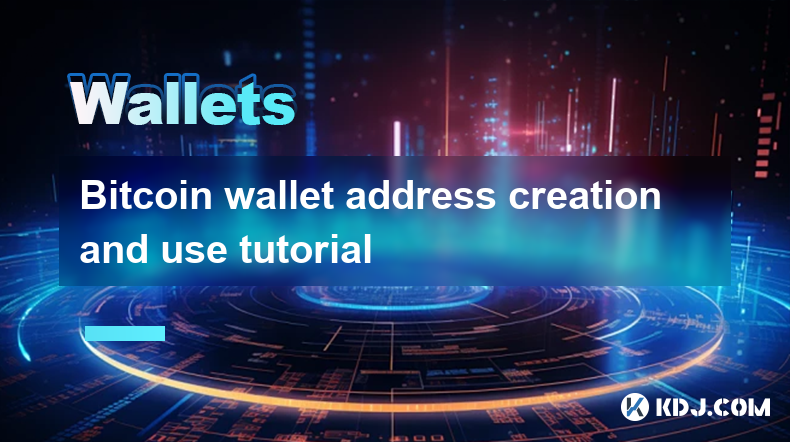
Bitcoin wallet address creation and use tutorial
Mar 29,2025 at 10:14pm
Understanding Bitcoin Wallet AddressesA Bitcoin wallet doesn't store Bitcoin in the way a traditional bank account does. Instead, it stores private keys, which are cryptographic secrets allowing you to access and spend your Bitcoin. Your Bitcoin address, on the other hand, is a public identifier, like an email address, that others can use to send you B...

Bitcoin address generation and secure storage guide
Mar 30,2025 at 08:07am
Understanding Bitcoin AddressesA Bitcoin address is essentially your public key, a string of alphanumeric characters used to receive Bitcoin. It's analogous to your bank account number. Unlike your private key, which is crucial for spending your Bitcoin, your address can be shared publicly without compromising your funds. Generating a new address is sim...
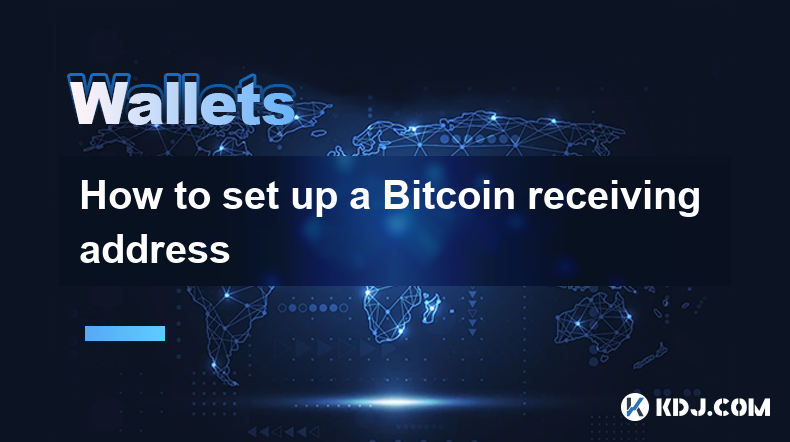
How to set up a Bitcoin receiving address
Mar 30,2025 at 06:14pm
Understanding Bitcoin Receiving AddressesA Bitcoin receiving address is essentially your unique identifier on the Bitcoin network. It's a string of alphanumeric characters that allows others to send Bitcoin to you. Think of it like your bank account number, but specifically for Bitcoin. You need a receiving address to receive Bitcoin. Crucially, you ca...

How to easily generate a Bitcoin payment address
Mar 29,2025 at 10:49am
Generating a Bitcoin payment address might seem daunting, but it's actually quite straightforward. This process is crucial for receiving Bitcoin, as each transaction requires a unique address. Understanding how this works is fundamental to using Bitcoin effectively. This guide will walk you through the simple steps, regardless of your technical experti...

Bitcoin address creation steps and common problems
Mar 30,2025 at 06:07am
Understanding Bitcoin AddressesA Bitcoin address is a unique identifier, similar to a bank account number, used to receive Bitcoin. It's a string of alphanumeric characters generated from a public key, derived from your private key. Understanding the distinction between public and private keys is crucial for Bitcoin security. Your private key should be...

How to make your own Bitcoin wallet address
Mar 29,2025 at 08:42pm
Creating your own Bitcoin wallet address is crucial for securing and managing your Bitcoin holdings. It allows you to independently receive and send Bitcoin without relying on third-party services. This process involves understanding the different types of wallets and choosing the one that best suits your needs and technical expertise. Incorrectly gene...

Bitcoin wallet address creation and use tutorial
Mar 29,2025 at 10:14pm
Understanding Bitcoin Wallet AddressesA Bitcoin wallet doesn't store Bitcoin in the way a traditional bank account does. Instead, it stores private keys, which are cryptographic secrets allowing you to access and spend your Bitcoin. Your Bitcoin address, on the other hand, is a public identifier, like an email address, that others can use to send you B...

Bitcoin address generation and secure storage guide
Mar 30,2025 at 08:07am
Understanding Bitcoin AddressesA Bitcoin address is essentially your public key, a string of alphanumeric characters used to receive Bitcoin. It's analogous to your bank account number. Unlike your private key, which is crucial for spending your Bitcoin, your address can be shared publicly without compromising your funds. Generating a new address is sim...

How to set up a Bitcoin receiving address
Mar 30,2025 at 06:14pm
Understanding Bitcoin Receiving AddressesA Bitcoin receiving address is essentially your unique identifier on the Bitcoin network. It's a string of alphanumeric characters that allows others to send Bitcoin to you. Think of it like your bank account number, but specifically for Bitcoin. You need a receiving address to receive Bitcoin. Crucially, you ca...
See all articles






















































































